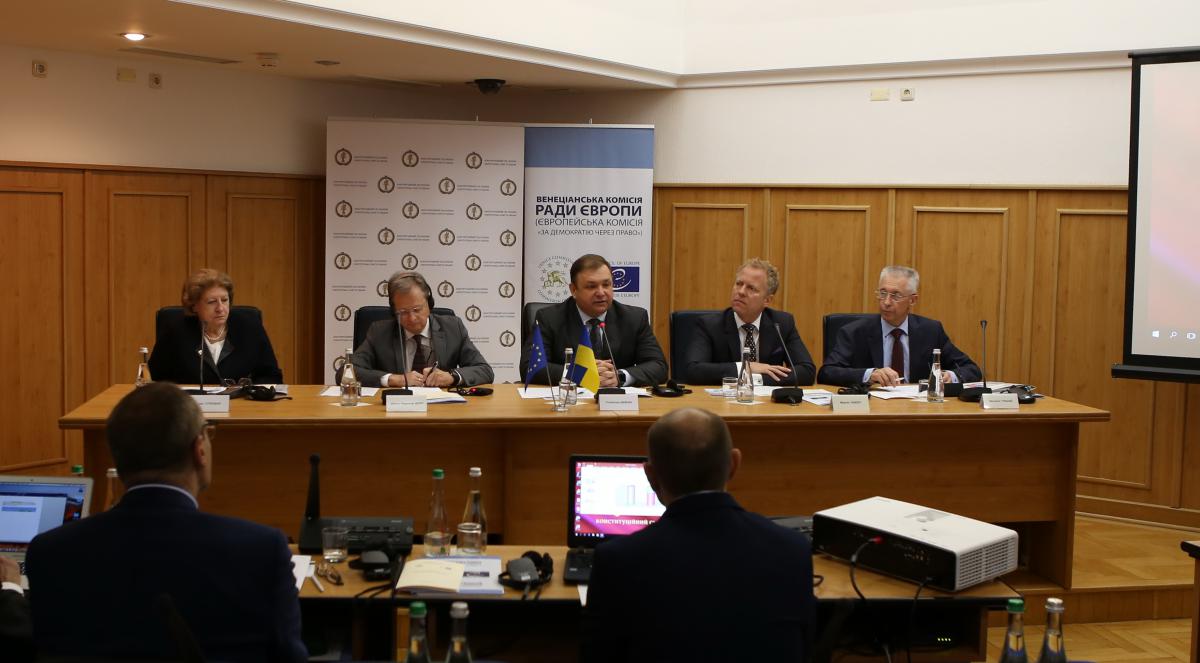International conference "Individual constitutional complaint to the Constitutional Court of Ukraine"
was held at the Constitutional Court of Ukraine
10.09.2018
On September 10, 2018 international conference "Individual Constitutional Complaint to the Constitutional Court of Ukraine" was held at the Constitutional Court of Ukraine.
The event was organised by the Constitutional Court of Ukraine in co-operation with the European Commission for Democracy through Law (Venice Commission).
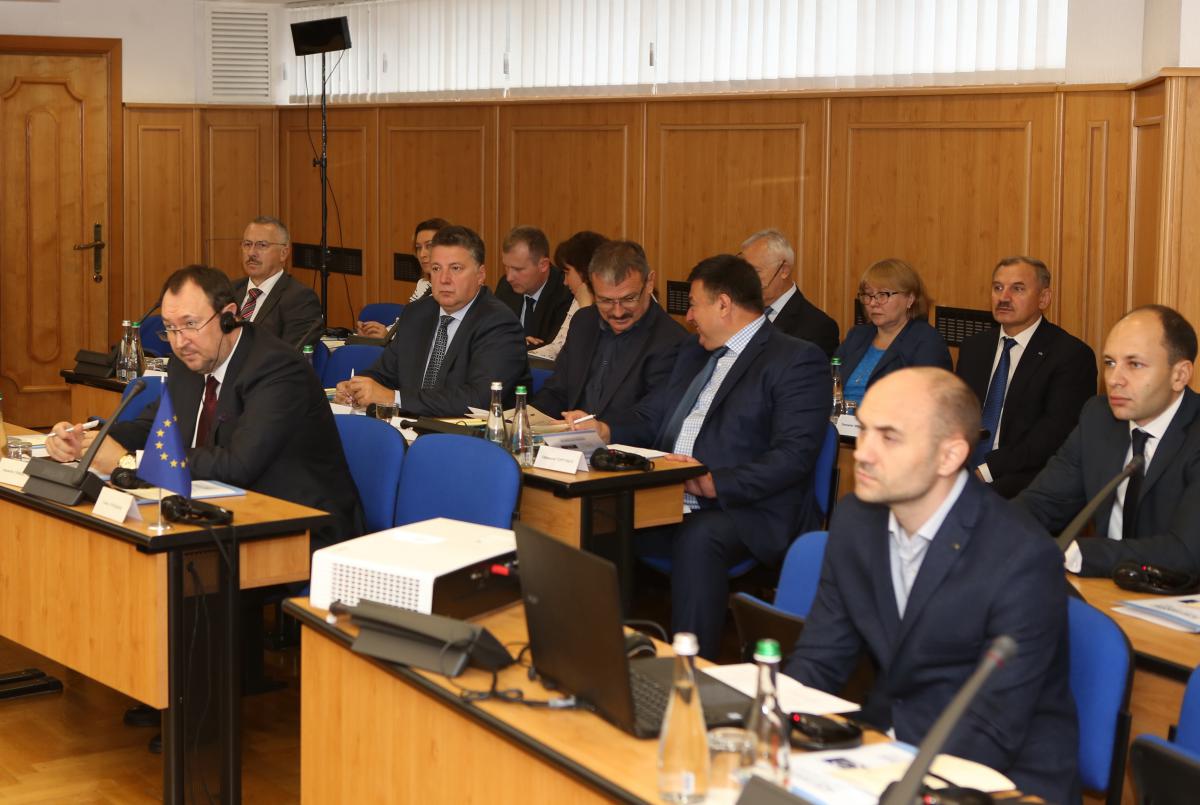 The conference was attended by Chairman of the Constitutional Court of Ukraine Stanislav Shevchuk, Deputy Chairman of the Constitutional Court of Ukraine Oleksandr Tupytskyi, Judges of the Constitutional Court of Ukraine Serhiy Holovaty, Viktor Horodovenko, Mykhailo Hultai, Oleksandr Kasminin, Viktor Kolisnyk, Vasyl Lemak, Honorary President of the Venice Commission, Professor of the University of Poznan Hanna Suchocka, Member of the Venice Commission, Former President of the Constitutional Court of Moldova (2011-2017) Alexandru Tănase, Project Manager of the Venice Commission of the Council of Europe Office in Ukraine Serhii Tkachenko, Professor of Jean-Monnet-Lehrstuhl für Europarecht Rainer Arnold, Professor, Chair of the Department of Constitutional Law of Cardinal Stefan Wyszyński University, former Judge of the Constitutional Tribunal of Poland Mirosław Granat, National Legal Advisor, Head of the Rule of Law Department of the OSCE Project Co-ordinator in Ukraine Oleksandr Vodiannykov, National Program Manager for Legal Reform of the OSCE Project Co-ordinator in Ukraine Vitalii Gatseliuk, Head of the Department of Analytical and Legal Work of the Supreme Court Rasim Babanly, employees of the Court’s Secretariat and others.
The conference was attended by Chairman of the Constitutional Court of Ukraine Stanislav Shevchuk, Deputy Chairman of the Constitutional Court of Ukraine Oleksandr Tupytskyi, Judges of the Constitutional Court of Ukraine Serhiy Holovaty, Viktor Horodovenko, Mykhailo Hultai, Oleksandr Kasminin, Viktor Kolisnyk, Vasyl Lemak, Honorary President of the Venice Commission, Professor of the University of Poznan Hanna Suchocka, Member of the Venice Commission, Former President of the Constitutional Court of Moldova (2011-2017) Alexandru Tănase, Project Manager of the Venice Commission of the Council of Europe Office in Ukraine Serhii Tkachenko, Professor of Jean-Monnet-Lehrstuhl für Europarecht Rainer Arnold, Professor, Chair of the Department of Constitutional Law of Cardinal Stefan Wyszyński University, former Judge of the Constitutional Tribunal of Poland Mirosław Granat, National Legal Advisor, Head of the Rule of Law Department of the OSCE Project Co-ordinator in Ukraine Oleksandr Vodiannykov, National Program Manager for Legal Reform of the OSCE Project Co-ordinator in Ukraine Vitalii Gatseliuk, Head of the Department of Analytical and Legal Work of the Supreme Court Rasim Babanly, employees of the Court’s Secretariat and others.
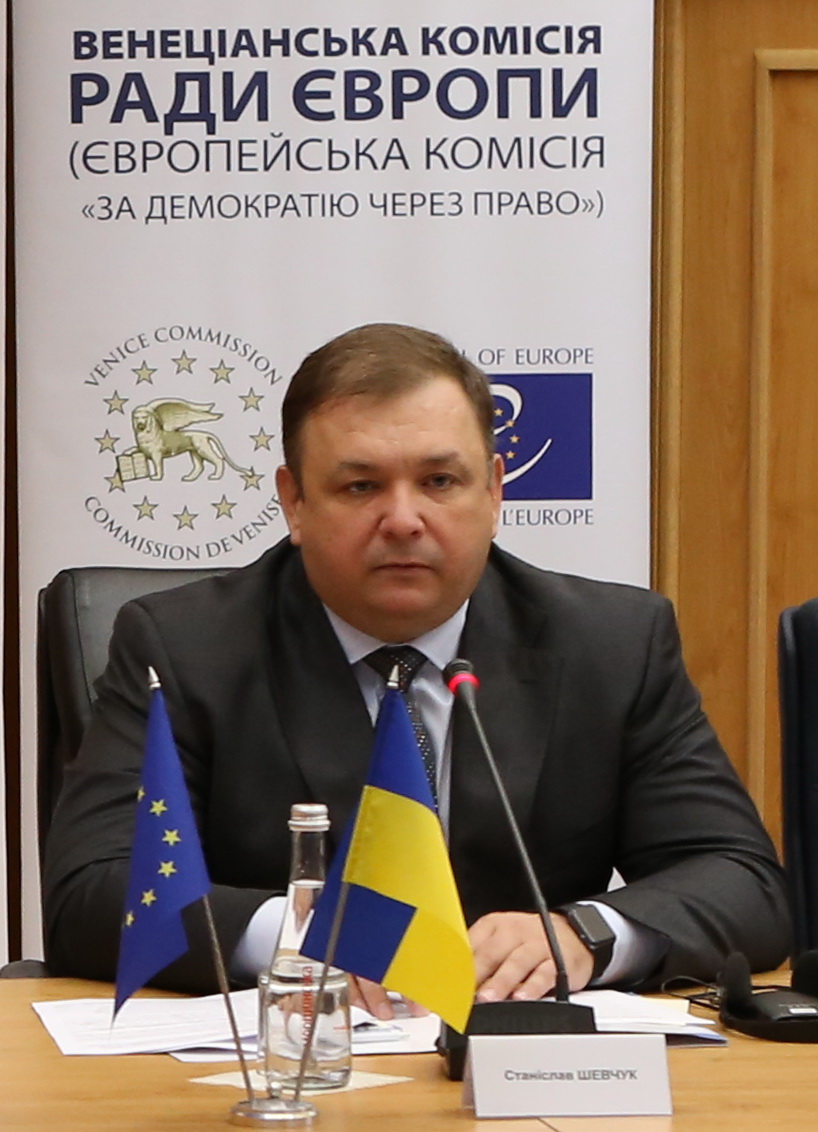 Doctor of Law, Professor, Corresponding Member of the National Academy of Legal Sciences of Ukraine, Chairman of the Constitutional Court of Ukraine Stanislav Shevchuk addressed the guests with introductory word. He welcomed the participants of the international conference and emphasised the relevance of the selected topics. The institute of the constitutional complaint is the result of judicial reform in 2016, noted Chairman of the Court. "This is the achievement of our legal system", said the speaker. With the introduction of this mechanism, the Court’s Chairman noted, the person is able to directly appeal to the Constitutional Court of Ukraine in order to protect his/her constitutional rights violated by law. According to him, constitutional complaint is directed against the state and against laws for the protection of human rights.
Doctor of Law, Professor, Corresponding Member of the National Academy of Legal Sciences of Ukraine, Chairman of the Constitutional Court of Ukraine Stanislav Shevchuk addressed the guests with introductory word. He welcomed the participants of the international conference and emphasised the relevance of the selected topics. The institute of the constitutional complaint is the result of judicial reform in 2016, noted Chairman of the Court. "This is the achievement of our legal system", said the speaker. With the introduction of this mechanism, the Court’s Chairman noted, the person is able to directly appeal to the Constitutional Court of Ukraine in order to protect his/her constitutional rights violated by law. According to him, constitutional complaint is directed against the state and against laws for the protection of human rights.
Stanislav Shevchuk said that within a year and a half the Constitutional Court of Ukraine had received 930 constitutional complaints, most of which were rejected, since they did not meet the formal requirements of the Law. According to him, proceedings were initiated on 12 constitutional complaints.
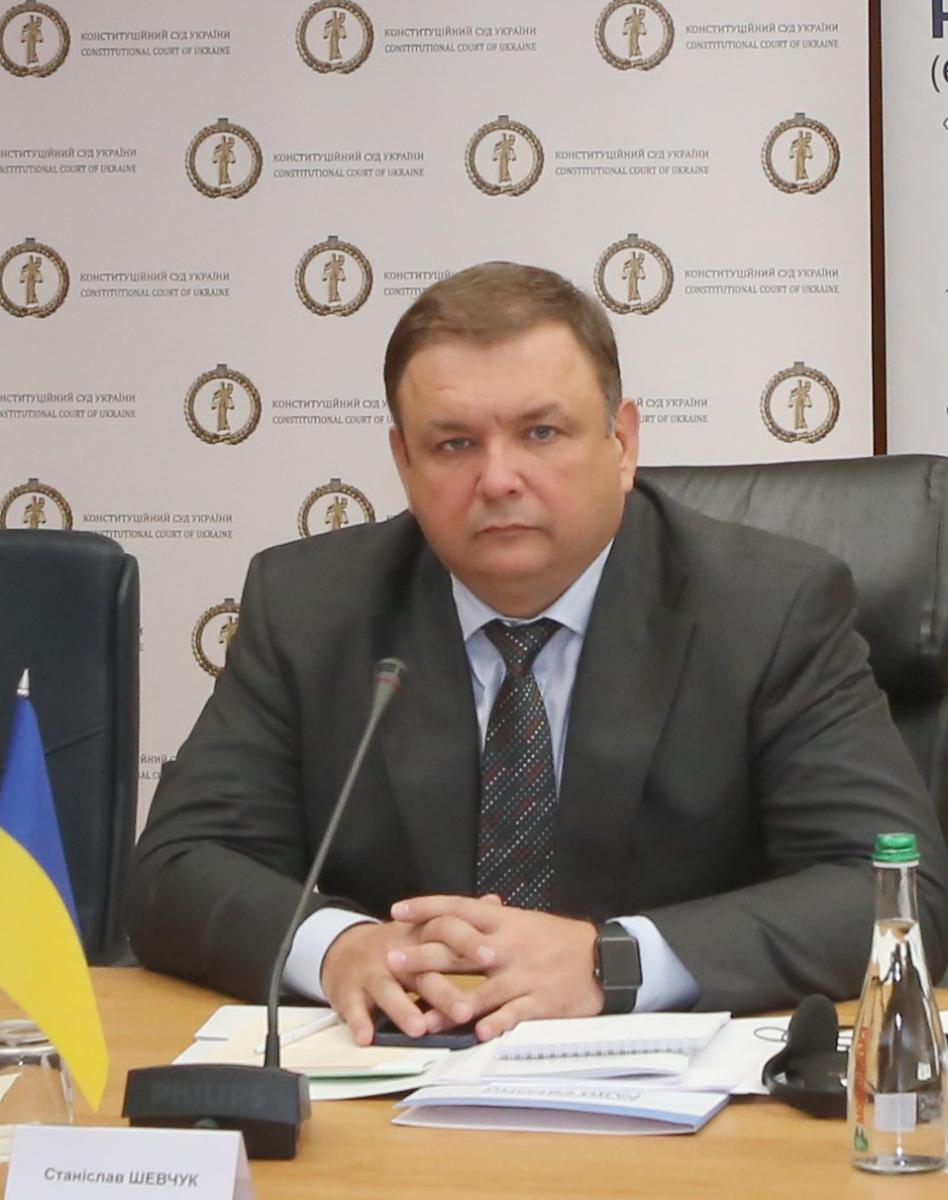 Chairman Shevchuk noted that the first experience of considering constitutional complaints indicates a lack of understanding of the nature of this institution. "There are requirements of the law, and we cannot bypass them", he added. According to Stanislav Shevchuk, the most common misconceptions of the complainants is that they do not indicate exactly which constitutional law was violated, do not take into account the timing of the filing of the complaint and the condition regarding the final decision of the court of appeal or cassation instance. The speaker stressed that it was the provisions of the law that were applied in the final judicial decision are the subject of consideration.
Chairman Shevchuk noted that the first experience of considering constitutional complaints indicates a lack of understanding of the nature of this institution. "There are requirements of the law, and we cannot bypass them", he added. According to Stanislav Shevchuk, the most common misconceptions of the complainants is that they do not indicate exactly which constitutional law was violated, do not take into account the timing of the filing of the complaint and the condition regarding the final decision of the court of appeal or cassation instance. The speaker stressed that it was the provisions of the law that were applied in the final judicial decision are the subject of consideration.
The Chairman of the Court stressed that the Constitutional Court of Ukraine faces many challenges, and therefore, he added, the mistakes are unacceptable. "People have to understand that we stand in defence of the rights of citizens, not politicians," he added. Yet, the speaker emphasised, the body of constitutional control of Ukraine, first of all, protects the Constitution.
Stanislav Shevchuk noted that the Constitutional Court of Ukraine had just begun considering the constitutional complaints. According to him, the second wave of constitutional complaints suggests that people are beginning to realise that this is a legal process.
 In his speech, the speaker emphasised fruitful and long-term cooperation with the Council of Europe and the European Commission for Democracy through Law (Venice Commission), in particular regarding the introduction of constitutional complaint. He thanked his foreign colleagues for participating in the event, and stressed that the Constitutional Court of Ukraine, as never before, needs international experience and support.
In his speech, the speaker emphasised fruitful and long-term cooperation with the Council of Europe and the European Commission for Democracy through Law (Venice Commission), in particular regarding the introduction of constitutional complaint. He thanked his foreign colleagues for participating in the event, and stressed that the Constitutional Court of Ukraine, as never before, needs international experience and support.
Head of the Delegation of the Council of Europe to Ukraine Morten Enberg said that the Council of Europe, as the leading European organisation in the field of human rights protection, ensures adherence to the high European standards and cooperates with Ukraine for their implementation. "We support Ukraine in implementing strategically important internal reforms", he stressed. According to him, the Council of Europe is closely following all the processes related to the implementation of reforms in Ukraine, in particular, the constitutional reform and the introduction of the constitutional complaint institute.
Morten Enberg reminded that as a result of the constitutional reform of justice of September 30, 2016, legal entities and individuals in Ukraine were able to exercise the right to lodge a constitutional complaint. With the help of this institute of individual access to constitutional justice, he noted that individuals were entitled to put before the Constitutional Court of Ukraine the issue of the recognition of an unconstitutional law (its separate clauses) which had been applied in a decision of a court of general jurisdiction over this person and to review this judgment.
"The main thing is that reforms are not only adopted at the level of the laws, but also successfully implemented", said the Head of the Delegation of the Council of Europe in Ukraine. Thus, it is the discussion of the practice of instituting a constitutional complaint in other countries that will allow implementation of this mechanism in Ukraine in accordance with existing European standards, he stressed.
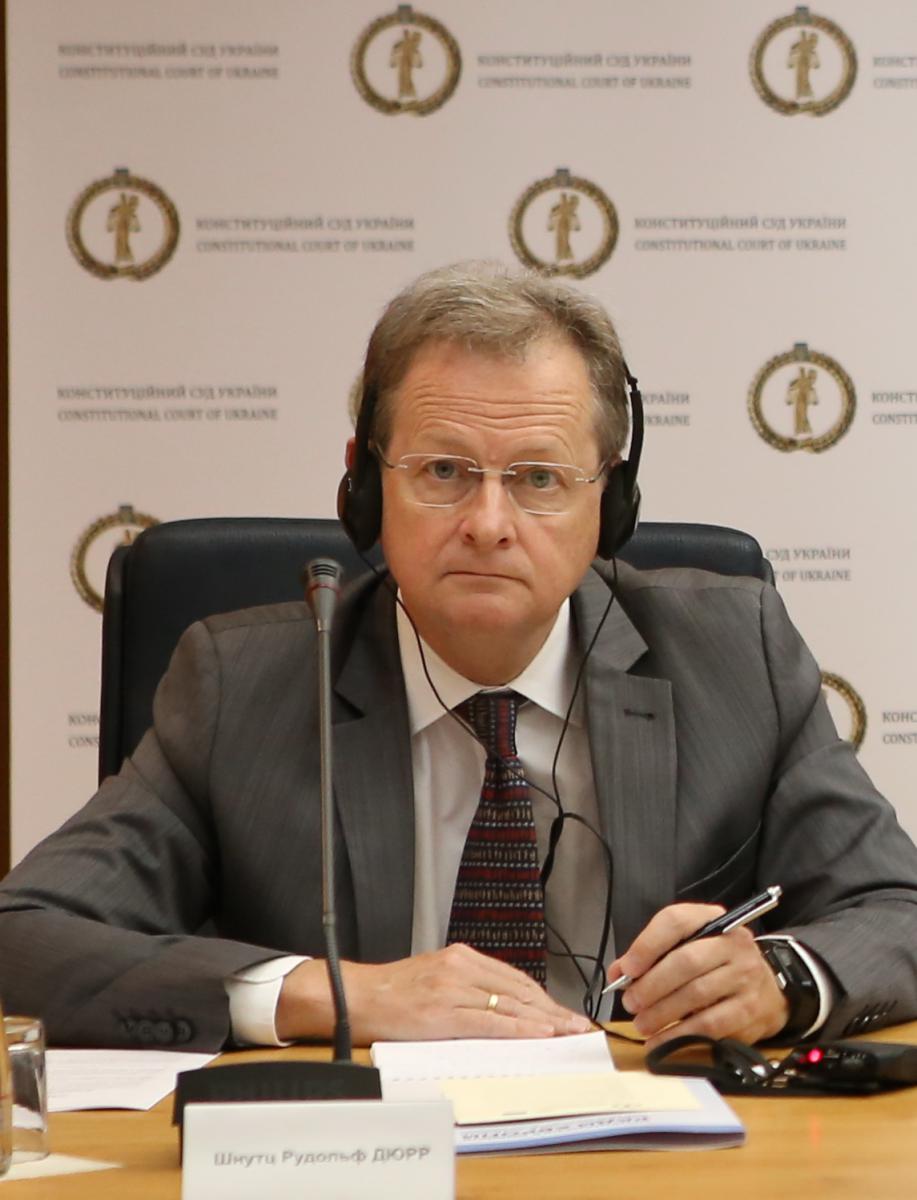 Doctor of Law, Head of the Department of Constitutional Justice of the European Commission for Democracy through Law (Venice Commission) Schnutz Dürr said that the Venice Commission in its Opinion supported the Draft Law "On the Constitutional Court of Ukraine", in particular regarding the selection of judges and the introduction of a constitutional complaint institute.
Doctor of Law, Head of the Department of Constitutional Justice of the European Commission for Democracy through Law (Venice Commission) Schnutz Dürr said that the Venice Commission in its Opinion supported the Draft Law "On the Constitutional Court of Ukraine", in particular regarding the selection of judges and the introduction of a constitutional complaint institute.
The Head of the Department of Constitutional Justice of the European Commission for Democracy through Law (Venice Commission) drew attention to the importance of substantiation of decisions of bodies of constitutional jurisdiction. "The Constitutional Court is not a political body, but the Court, which has a qualitative explanation of its decisions," he added. In his opinion, the decisions of the Court should be clear and understandable.
Schnutz Dürr noted that the European community appreciates the openness of the Constitutional Court of Ukraine. In his opinion, the openness of the Court is important for the positive perception of the decisions of the body of constitutional control of the country. In addition, he added, open communication with society strengthens the position of the Constitutional Court in Ukraine.
The speaker also described in detail the practice of the functioning of constitutional complaint in Germany. He underlined that the constitutional complaint allowed to achieve significant results in the field of human rights protection in Germany, and expressed the hope that this institution will become a success for Ukraine.
 In the framework of the first meeting on "Individual complaint", the Honorary President of the European Commission for Democracy through Law (Venice Commission), Professor of the University of Poznan (Republic of Poland) Hanna Suchocka presented a report. In her speech, she emphasised that the Venice Commission experts were involved in the work of the Constitutional Commission when drafting amendments to the Constitution of Ukraine on justice, in particular, in the part that regulates the activities of the Constitutional Court of Ukraine.
In the framework of the first meeting on "Individual complaint", the Honorary President of the European Commission for Democracy through Law (Venice Commission), Professor of the University of Poznan (Republic of Poland) Hanna Suchocka presented a report. In her speech, she emphasised that the Venice Commission experts were involved in the work of the Constitutional Commission when drafting amendments to the Constitution of Ukraine on justice, in particular, in the part that regulates the activities of the Constitutional Court of Ukraine.
The speaker stressed that the Venice Commission positively assessed the introduction of the constitutional complaint institute into the Ukrainian legal system. She stressed that the role of the Constitutional Court of Ukraine increases when citizens are able to protect their constitutional rights.
Hanna Suchocka dwelt upon separate articles of the Law of Ukraine "On the Constitutional Court of Ukraine", in particular regarding guarantees of citizens' appeals to the Court with a constitutional complaint, specific requirements to the Court's decision and the status of judges. The professor added that the introduction of a "normative" model of constitutional complaint is the first step towards strengthening the system of human rights protection, and also said she was in favour of the full constitutional complaint. "However, the system that currently exists already provides a guarantee of human rights protection", emphasised Hanna Suchocka.
 Judge of the Constitutional Court of Ukraine Mykhailo Hultai presented a report on "Individual constitutional complaint to the Constitutional Court of Ukraine - the legislative basis and the first experience", and noted that the Constitutional Court of Ukraine had undergone a difficult path of formation and incipience and began the third decade of its activity with the constant desire to strengthen the social confidence in the body of constitutional jurisdiction, which ensures the supremacy of the Fundamental Law of Ukraine.
Judge of the Constitutional Court of Ukraine Mykhailo Hultai presented a report on "Individual constitutional complaint to the Constitutional Court of Ukraine - the legislative basis and the first experience", and noted that the Constitutional Court of Ukraine had undergone a difficult path of formation and incipience and began the third decade of its activity with the constant desire to strengthen the social confidence in the body of constitutional jurisdiction, which ensures the supremacy of the Fundamental Law of Ukraine.
In his speech, the rapporteur presented statistics on constitutional complaints received by the Court and their processing as of August 31, 2018, presenting infographics to the participants.
The speaker stressed that the Constitutional Court of Ukraine received 930 constitutional complaints, among which 649 (70%) complaints were returned to the applicants since they did not meet the requirements of the Law of Ukraine "On the Constitutional Court of Ukraine" in the form, with the corresponding explanations and indication of the possibility of reapplying with observance of the requirements of this law.
The judge also pointed out that out of 270 constitutional complaints distributed among judges of the Court, one-third was filed repeatedly, that is, taking into account the comments made by the Secretariat of the Court on the form, and further eliminating the deficiencies that were identified during their preliminary examination.
 In his speech, Mykhailo Hultai emphasised that the Court often refuses to initiate constitutional proceedings in cases on the basis of the provisions of Article 62 of the Law of Ukraine "On the Constitutional Court of Ukraine", i.e. the inadmissibility of the constitutional complaint (158 – the board, 12 - the senate) and issues raised in the constitutional petition, constitutional appeal, or the constitutional complaint fall beyond the Court’s competence (40 - board, 2 - senates).
In his speech, Mykhailo Hultai emphasised that the Court often refuses to initiate constitutional proceedings in cases on the basis of the provisions of Article 62 of the Law of Ukraine "On the Constitutional Court of Ukraine", i.e. the inadmissibility of the constitutional complaint (158 – the board, 12 - the senate) and issues raised in the constitutional petition, constitutional appeal, or the constitutional complaint fall beyond the Court’s competence (40 - board, 2 - senates).
In addition, the judge analysed the laws of Ukraine (separate provisions), which were contested by the subjects of the right to a constitutional complaint, and focused on the issues raised by them in 2018. Mykhailo Hultai noted that there are 19 laws, among them the laws of Ukraine "On Civil Service", "On the Prosecutor's Office", "On Mandatory State Pension Insurance", "On the Judiciary and the Status of Judges", as well as the Criminal Procedure Code of Ukraine, The Code of Administrative Justice of Ukraine, etc.
 The speaker focused on certain problematic issues that the legislator left behind, in particular, whether the Constitutional Court, in assessing the admissibility of the constitutional complaint and the reasoning of the position of the subject of the right to a constitutional complaint, establishes violations of the human rights guaranteed by the Constitution of Ukraine as a result of the application of the law without an assessment of the facts, on its established role of "court of law"; on the definition of the circle of subjects of the right to constitutional complaint, which includes legal entities of public law; the lack of authority of the Constitutional Court to provide fair compensation for the outcome of the consideration of the constitutional complaint, despite the existence of an interim order.
The speaker focused on certain problematic issues that the legislator left behind, in particular, whether the Constitutional Court, in assessing the admissibility of the constitutional complaint and the reasoning of the position of the subject of the right to a constitutional complaint, establishes violations of the human rights guaranteed by the Constitution of Ukraine as a result of the application of the law without an assessment of the facts, on its established role of "court of law"; on the definition of the circle of subjects of the right to constitutional complaint, which includes legal entities of public law; the lack of authority of the Constitutional Court to provide fair compensation for the outcome of the consideration of the constitutional complaint, despite the existence of an interim order.
 In conclusion, Mykhailo Hultai emphasised that the citizens' need for a constitutional complaint today is more than obvious. Of course, constitutional complaint will not be able to affect the number of unconstitutional provisions contained in the laws, while they should become a kind of "stop-signal" for the legislator, added speaker. According to the results of consideration of constitutional complaints, there must be an effective mechanism for ensuring the constitutional right of citizens to compensation for damage, speaker stressed.
In conclusion, Mykhailo Hultai emphasised that the citizens' need for a constitutional complaint today is more than obvious. Of course, constitutional complaint will not be able to affect the number of unconstitutional provisions contained in the laws, while they should become a kind of "stop-signal" for the legislator, added speaker. According to the results of consideration of constitutional complaints, there must be an effective mechanism for ensuring the constitutional right of citizens to compensation for damage, speaker stressed.
Within the framework of the first session professor of the Jean-Monnet-Lehrstuhl für Europarecht, Regensburg, Germany, Rainer Arnold delivered a presentation. He thanked the host Court for the opportunity to take part in such an event and presented report on "The Constitutional Complaint in Germany and Ukraine".
In his speech, Rainer Arnold dwelt upon the history of the introduction of an individual constitutional complaint in Germany. He highlighted that almost six thousand individual complaints are lodged with the Court per year, 90% of which are not admitted for consideration. The speaker dwelt in detail on the elements of the German model of the individual constitutional complaint as an effective means of protecting the rights of citizens. The professor mentioned that subjects of appeal to the Federal Constitutional Court of Germany may be both private individuals and legal entities, communities and associations of communities in accordance with the law.
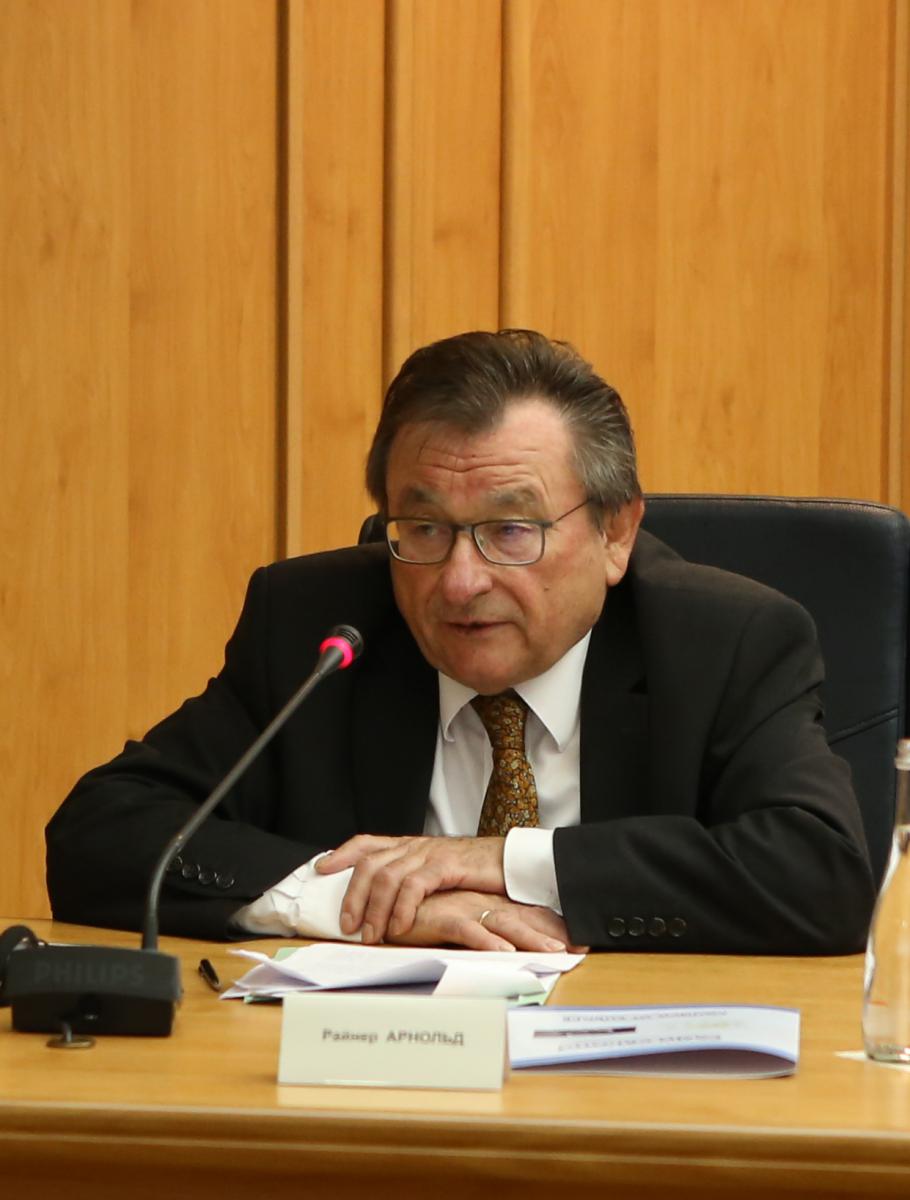 The subject which may be challenged by the constitutional complaint is any regulatory act, noted Rainer Arnold. In addition, it is possible to appeal both the action and the inaction of the executive power of the Federation or the Land, he added. The condition for filing a constitutional complaint is the exhaustion of all domestic remedies, observance of the time limits for filing complaints. "The complaint should indicate how the impugned law affects or may affect human rights in the future," speaker stressed.
The subject which may be challenged by the constitutional complaint is any regulatory act, noted Rainer Arnold. In addition, it is possible to appeal both the action and the inaction of the executive power of the Federation or the Land, he added. The condition for filing a constitutional complaint is the exhaustion of all domestic remedies, observance of the time limits for filing complaints. "The complaint should indicate how the impugned law affects or may affect human rights in the future," speaker stressed.
Rainer Arnold in his report also dwelt on the peculiarities of the work of the Federal Constitutional Court of Germany, which acts on the basis of the proportionality principle. He stressed that the constitutional control body is not the "fourth instance", since the Constitutional Court can only consider violations of constitutional rights. In addition, the Federal Constitutional Court of Germany always interprets the country's law in the light of the jurisprudence of the European Court of Human Rights, the speaker summarised.
Professor, Chair of the Department of Constitutional Law, Cardinal Stefan Wyszyński University, Warsaw, former Judge of the Constitutional Tribunal of Poland Mirosław Granat expressed his gratitude to the Chairman of the Constitutional Court of Ukraine Stanislav Shevchuk for the opportunity to visit Ukraine and communicate with his colleagues, as well as the opportunity to present a report on " The Constitutional Complaint in Poland and Ukraine".
The speaker drew attention to the peculiarities of the legislative regulation of the constitutional complaint institute in Poland and shared experience of ensuring citizens' access to constitutional justice in his country.
According to Art. 79.1 of the Constitution of the Republic of Poland, the subject of a constitutional complaint may be any person whose constitutional rights and freedoms have been violated, noted the professor. But, in his opinion, the greatest value of a constitutional complaint is that it allows to decide on unconstitutionality of the law or normative act that violates constitutional rights and freedoms of citizens.
 Mirosław Granat highlighted two stages of consideration of constitutional complaints: preliminary examination and consideration of the merits. The preliminary examination, according to speaker, concerns the admissibility of consideration of the constitutional complaint, in particular the analysis of the availability of all the conditions for its admissibility. "About 90% of constitutional complaints are rejected by the Court precisely at this stage," he noted. The main reasons for the refusal to consider constitutional complaints are, in particular, the failure to comply with the terms of the deadline for filing and not using all judicial means, added speaker.
Mirosław Granat highlighted two stages of consideration of constitutional complaints: preliminary examination and consideration of the merits. The preliminary examination, according to speaker, concerns the admissibility of consideration of the constitutional complaint, in particular the analysis of the availability of all the conditions for its admissibility. "About 90% of constitutional complaints are rejected by the Court precisely at this stage," he noted. The main reasons for the refusal to consider constitutional complaints are, in particular, the failure to comply with the terms of the deadline for filing and not using all judicial means, added speaker.
In addition, Mirosław Granat dwelt in detail on the Court's decisions and their implications. In particular, the loss of an act of its mandatory nature is a macro consequence, and the possibility of the complainant to require the court of general jurisdiction to resume its proceedings in the case - a micro consequence.
The Former judge of the Constitutional Tribunal of the Republic of Poland also informed the audience that between 1997 and 2018 the Constitutional Tribunal of the Republic of Poland had received about five thousand constitutional complaints.
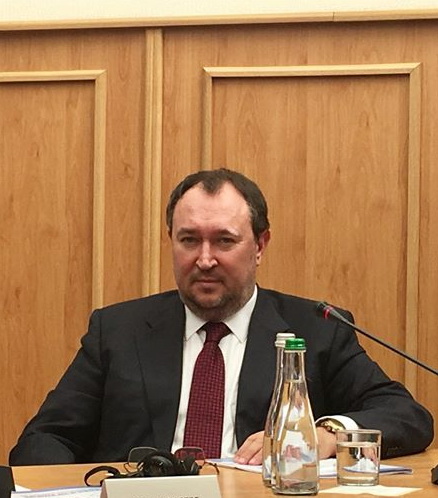 The second session of the conference was devoted to reasoning of decisions of constitutional courts. For example, Member of the Venice Commission, Former President of the Constitutional Court of Moldova (2011-2017), Alexandru Tănase, dwelt in detail on the reasoning of the decisions of the Constitutional Court of the Republic of Moldova. "This topic is relevant not only for Ukraine, but also for the whole legal community", noted speaker.
The second session of the conference was devoted to reasoning of decisions of constitutional courts. For example, Member of the Venice Commission, Former President of the Constitutional Court of Moldova (2011-2017), Alexandru Tănase, dwelt in detail on the reasoning of the decisions of the Constitutional Court of the Republic of Moldova. "This topic is relevant not only for Ukraine, but also for the whole legal community", noted speaker.
According to him, the reasoning of decisions of the Constitutional Court is not only a technical issue, but also raises the value of the acts of the Court. According to him, the very reasoning of decisions of bodies of constitutional jurisdiction is a source of law. "The requirements for reasoning of decisions of the constitutional courts are the most severe, since their conclusions are important for both the legislator and the judges of the general courts," he emphasised.
Alexandru Tănase brought out a number of court decisions, in particular, Moldavian, Hungarian, and analysed them in detail in the subject of reasoning. He emphasised that the decisions of the constitutional courts should be clear and well-substantiated, since they have an impact on the entire legal system of the state.
In addition, according to the speaker, substantiated court decisions are a factor of stability. He noted that only the strict observance of the rule of law protects the Constitution, and independent justice cannot exist without a correct and clear argument.
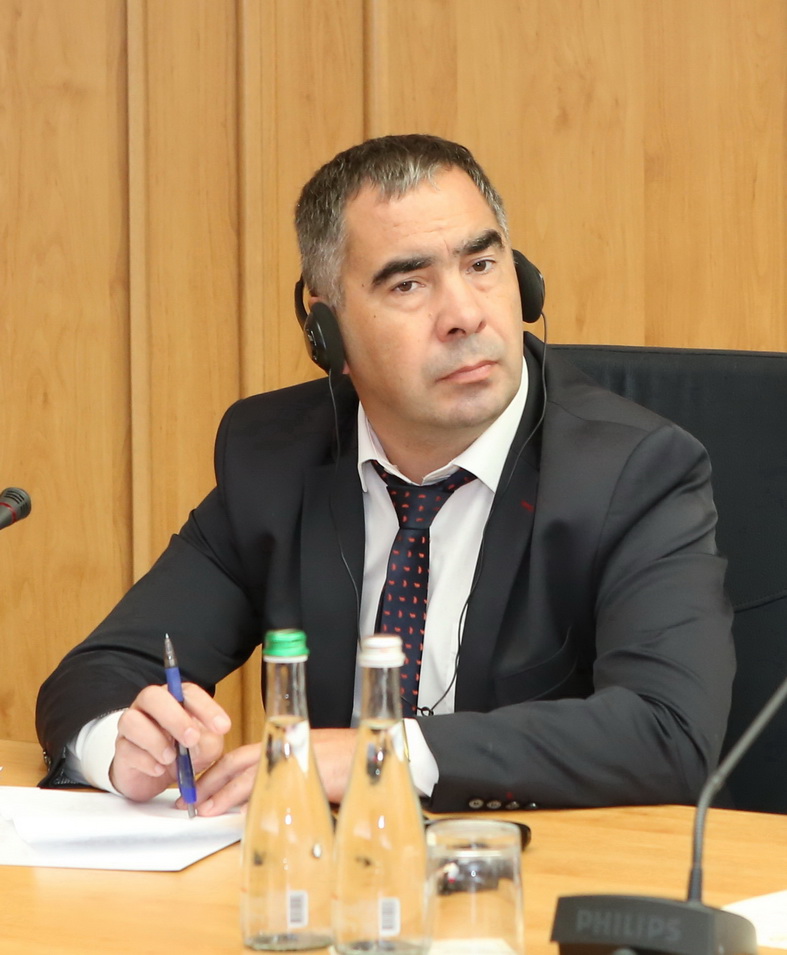 Vasyl Lemak, judge of the Constitutional Court of Ukraine, addressed the same subject, he presented report on "The reasoning of the decisions of the Constitutional Court of Ukraine".
Vasyl Lemak, judge of the Constitutional Court of Ukraine, addressed the same subject, he presented report on "The reasoning of the decisions of the Constitutional Court of Ukraine".
"The rule of law begins with the reasoning of court decisions. Lack of proper reasoning is a violation of the right to a fair trial", stated judge Lemak.
Referring to the paradigm of perceiving the problem of justification of court decisions, the speaker mentioned the judgment of the European Court of Human Rights in the case of Kurt v. Turkey and analysed five factors which, in his opinion, influence the reasoning of decisions of the Constitutional Court of Ukraine
So, the first factor is "legal coordinates", that is, the parameters of the rule of law in which the Court operates, noted Vasyl Lemak. First of all, it is about understanding the Constitution, in particular its text and implicit part, as well as the role of official constitutional doctrine and international law. He explained that, for example, in Lithuania and Moldova there are decisions which formulate a position on the perception of the Constitution as a legal reality. The judge of the Constitutional Court is convinced that "The Constitution is not only the text, but also the values and principles". In addition, he believes that the official constitutional doctrine is not a separate decision, but a well-established practice of the Court, which was formed during the decade.
The second factor, according to Vasyl Lemak, is the Court's perception of its own authority. "The Constitutional Court of Ukraine has received new powers, and judges are debating where the limits of these powers are", stressedthe speaker. In his opinion, the Constitution itself lays down appropriate powers, so the Court must draw them directly from the Basic Law. He also dwelt on the problematic issues that may arise in interpreting the powers of the Court.
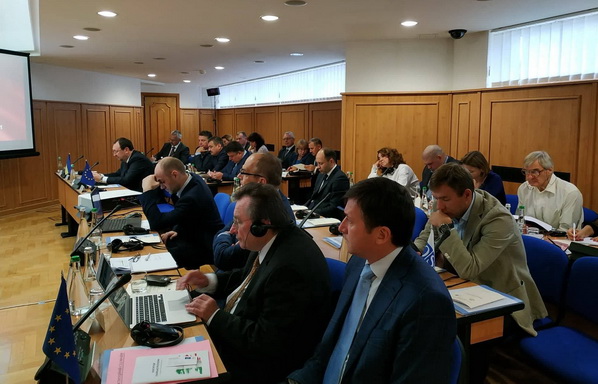 According to the Judge, the third factor is the extension of the methodology and, above all, the methods of reasoning applied by the Court, based on the particular circumstances of the case. The speaker noted that in recent years the arsenal of methods of argumentation has increased considerably, in particular by borrowing international experience.
According to the Judge, the third factor is the extension of the methodology and, above all, the methods of reasoning applied by the Court, based on the particular circumstances of the case. The speaker noted that in recent years the arsenal of methods of argumentation has increased considerably, in particular by borrowing international experience.
Vasyl Lemak noted that the next factor is the question of the facts and evidence of actual data in the constitutional proceeding, for example, when checking the "violation" of the constitutional procedure. "There is an opinion that the Constitutional Court is a court of law that does not investigate the facts. At the same time, in terms of reasoning, this is not the case, because where there is a procedure, there is a fact ", noted the judge. According to him, if such a criterion of constitutionality of acts is envisaged, such as observance of the established constitutional procedure for consideration, approval and entry into force, the establishment of relevant facts is a necessary procedure.
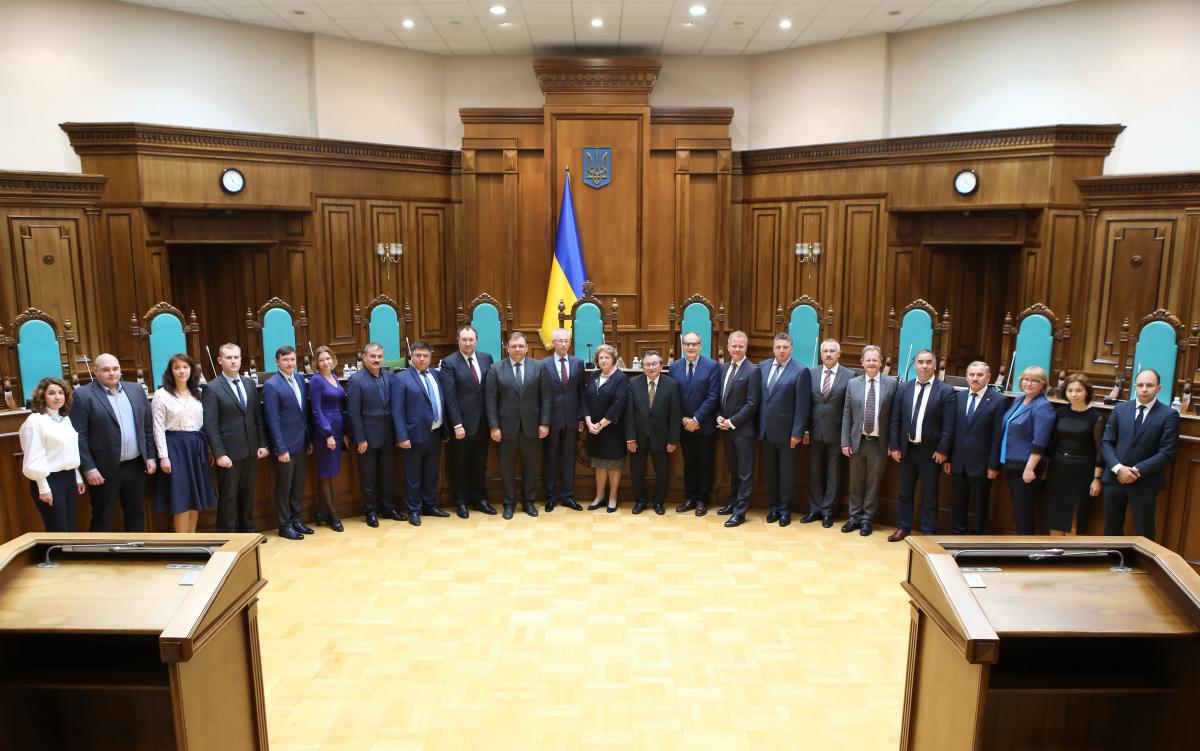 The reports provoked a lively discussion among the participants of the event. The Chairman of the Constitutional Court of Ukraine Stanislav Shevchuk, concluding the international conference, noted the high level of discussions and emphasised that such measures can increase the institutional capacity of the constitutional control body of the country. "The Constitutional Court of Ukraine is ready to protect individuals in accordance with the Basic Law of the State", summed up the Chairman of the Court.
The reports provoked a lively discussion among the participants of the event. The Chairman of the Constitutional Court of Ukraine Stanislav Shevchuk, concluding the international conference, noted the high level of discussions and emphasised that such measures can increase the institutional capacity of the constitutional control body of the country. "The Constitutional Court of Ukraine is ready to protect individuals in accordance with the Basic Law of the State", summed up the Chairman of the Court.

